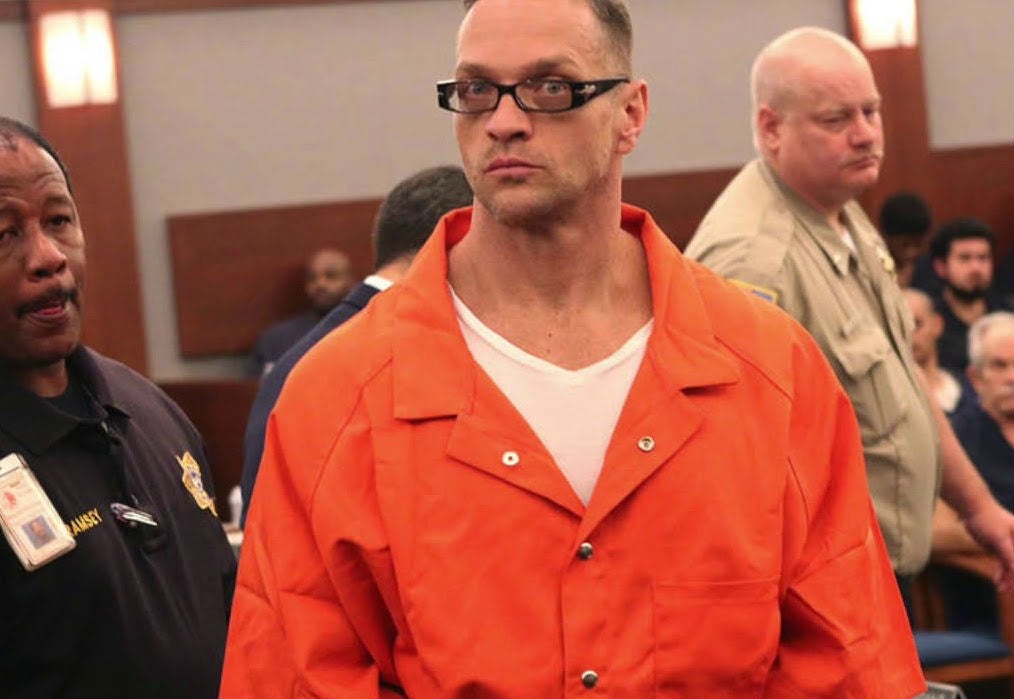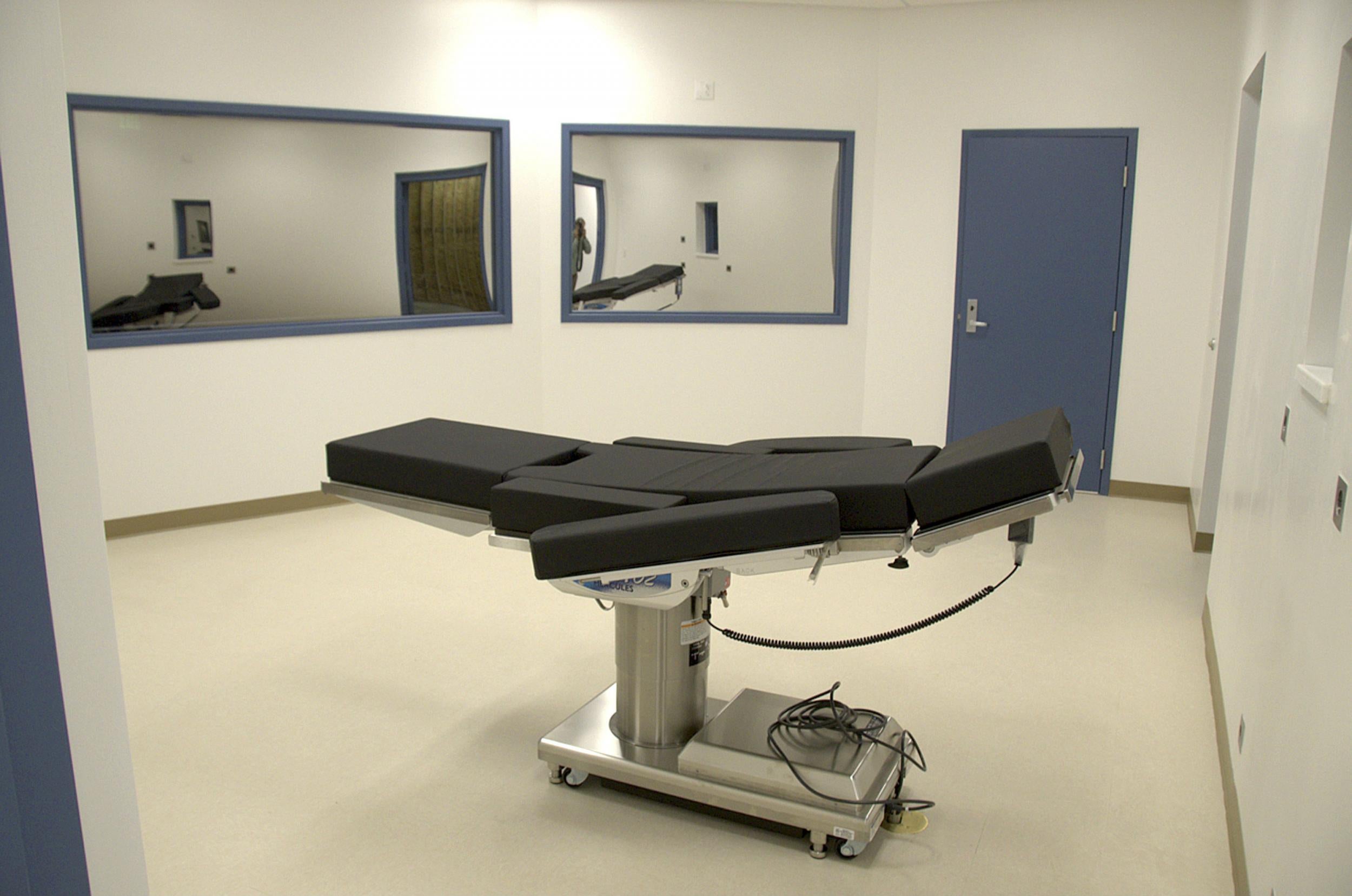Judge halts execution of murderer due to to be killed by lethal cocktail never before used in US
Convicted killer has ended all appeals and says he wants to die

Your support helps us to tell the story
From reproductive rights to climate change to Big Tech, The Independent is on the ground when the story is developing. Whether it's investigating the financials of Elon Musk's pro-Trump PAC or producing our latest documentary, 'The A Word', which shines a light on the American women fighting for reproductive rights, we know how important it is to parse out the facts from the messaging.
At such a critical moment in US history, we need reporters on the ground. Your donation allows us to keep sending journalists to speak to both sides of the story.
The Independent is trusted by Americans across the entire political spectrum. And unlike many other quality news outlets, we choose not to lock Americans out of our reporting and analysis with paywalls. We believe quality journalism should be available to everyone, paid for by those who can afford it.
Your support makes all the difference.A judge has effectively halted the execution of a convicted killer hours before he was to be put to death, after a pharmaceutical firm said it did not want its products used in “botched” lethal injections.
The state of Nevada had been scheduled on Wednesday night to execute Scott Dozier, who had dropped all appeals and said he wanted to die, even if he suffered pain during the process. The combination of chemicals the Nevada Board of Corrections intended to inject him with had never been used before in the country.
A New Jersey-based pharmaceutical firm, Alvogen, manufacturer of the sedative midazolam, which has been used in executions by several states, with often horrific results, claimed Nevada obtained the drug “by subterfuge”.
The company had filed a lawsuit seeking to ensure its product not be used in Dozier’s execution. On Wednesday morning, Clark County District Court Judge Elizabeth Gonzalez ordered that the use of the chemical be delayed.
As a result, the state said it would not proceed with Dozier’s execution until it had time to reassess the logistics of doing so. The judge ordered a new hearing for 10 September.
An 80-page lawsuit filed by Alvogen in Las Vegas on Tuesday said: “Midazolam is not approved for use in such an application... Use of midazolam in other states has been extremely controversial and have led to widespread concern that prisoners have been exposed to cruel and unusual treatment.”
The company pointed out that, previously, midazolam had been used in the botched executions of Clayton Lockett, Joseph Wood and Ronald Smith. Alvogen said in April 2014 Oklahoma attempted to use an untested three-drug cocktail that included midazolam during Lockett’s execution.
“He reportedly regained consciousness and started speaking midway through the process. Prison officials reportedly cancelled the execution and discussed taking him to the hospital before he died from a heart attack 40 minutes after the execution started,” said the company.
On Wednesday, after the judge granted Alvogen’s request for a temporary restraining order, the company said in a statement: “Alvogen is pleased with the court’s decision and will continue to work through the judicial process to ensure Alvogen’s products are not used in executions.
Efforts to halt the execution received the support of Sister Helen Prejean, the veteran anti-death penalty campaigner whose 1993 book Dead Man Walking was made into a film starring Susan Sarandon.
“Thank you to @alvogenpr for standing up against Nevada’s deception and illicit drug purchases,” she wrote.
“No human being should ever be executed, especially not with unapproved drugs obtained through false pretences. This kind of state behaviour is a direct cause of botched executions.”
Halldór Kristmannsson, a spokeswoman for Alvogen, said the company did not “market, promote or condone the use of any of its approved prescription drug products, including midazolam, for use in state sponsored executions”.
She added: “With respect to the alleged intent of the State of Nevada Department of Corrections to use our midazolam product in an execution, we are exploring all potential avenues, including legal recourse, to prevent the improper use of our product in this particular execution.”
Brooke Santina, a spokeswoman for the Nevada Department of Corrections, said it had no comment “before the hearing”.
Alvogen, whose lawsuit includes eight separate counts against the State of Nevada, the Nevada Department of Corrections, the Nevada Chief Medical Officer, and the anonymous doctor who will participate in the execution, said it distributes midazolam as an injectable medication, approved by the US Food and Drug Administration, for use in inducing general anaesthesia and preoperative sedation.
Alvogen said that Nevada obtained its product through the wholesaler Cardinal Health.
“Alvogen and Cardinal Health negotiated and entered into a contract in May 2018 that honoured Alvogen’s commitment to preventing the use of its products in executions,” said Sister Prejean.
“In other words, Cardinal Health was barred from selling Alvogen drugs for use in a lethal injection.”
Earlier this year, Alvogen sent a letter to the director of the Nevada Department of Corrections on 20 April 2018. A similar letter was sent to the warden at the Ely State Prison, 250 miles north of Las Vegas, where Nevada’s death row is located.
“Alvogen is aware that certain medicines we manufactured for specific healthcare applications are currently sought by some correctional facilities in the US for use in lethal injection executions,” said the letter written by Andrea Sweet, vice president for legal affairs.
“I am writing to communicate in the clearest possible terms that Alvogen strongly objects to the use of its products in capital punishment. While Alvogen takes no position on the death penalty itself, our products were developed to save and improve people’s lives, and their use in executions is fundamentally contrary to this purpose,” she wrote.
Dozier, a twice-convicted killer who attempted suicide in the past, has said he preferred death to a life in prison.

“I’ve been very clear about my desire to be executed... even if suffering is inevitable,” he said in a handwritten note to a judge who postponed his execution in November over concerns the untried drug regimen could leave him suffocating, conscious and unable to move.
In 2005, Dozier was sentenced to 22 years in prison for the shooting and mauling of 26-year-old Jasen Greene, whose body was found in 2002 in a shallow grave outside Phoenix.
A witness there testified that Dozier used a sledgehammer to break Greene’s limbs so the corpse would fit in a plastic tote that Dozier used to transport methamphetamine, equipment and chemicals.
Dozier was sentenced to die for robbing, killing and dismembering 22-year-old Jeremiah Miller at a Las Vegas motel in 2002.
Dozier suspended any appeals of his conviction and sentence, which would make him one of about 10 per cent of the 1,477 inmates who gave up appeals and were executed nationwide since 1977, according to the Death Penalty Information Centre in Washington. Critics say he is seeking state-assisted suicide.
The state’s high court in May decided on procedural grounds that the execution could go forward, but did not review the three-drug protocol that death penalty experts have characterised as experimental and risky.
“Because Nevada is using a combination of drugs that no one has used before, there is a lot about its protocol that we don’t know anything about,” said Robert Dunham, death penalty centre executive director.
The midazolam was expected to place Dozier unconscious before he was injected with the powerful synthetic opioid fentanyl, which has been blamed for overdoses nationwide but has not been used in an execution. That was to have been followed by the muscle-paralysing drug cisatracurium.
Midazolam has been used with inconsistent results in states including Alabama, Arkansas, Arizona, Florida and Ohio. Mr Dunham noted the 2014 executions of Dennis McGuire in Ohio and Joseph Rudolph Wood III in Arizona left both inmates gasping and snorting before they died.
Nevada’s last execution occurred in 2006, when Daryl Linnie Mack asked to be put to death for his conviction in a 1988 rape and murder in Reno.
It was reported that a second pharmaceutical company, Sandoz, also raised objections at Wednesday’s hearing to the use of one of its drugs, cisatracurium. But the company did not immediately ask to formally join Alvogen’s lawsuit.
A third company, Pfizer, last year demanded Nevada return the third drug intended for use in the execution, fentanyl. But the state refused.
Join our commenting forum
Join thought-provoking conversations, follow other Independent readers and see their replies
Comments